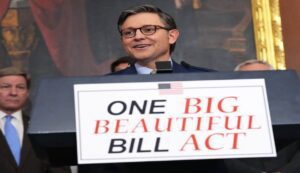Republicans issues warning of One Big Beautiful Bill Act impact on 2026 midterm elections
Washington, DC: Republicans have been cautioned that the One Big Beautiful Bill Act, which was just passed by the party, may have significant effects on the 2026 midterm elections.

On Fox News’ America’s Newsroom, veteran GOP strategist Karl Rove stated, “I think it’ll have a huge impact on 2026, because, remember, as these changes, particularly the Medicaid changes, come into effect, they’re going to have people losing their coverage.”
Vice President JD Vance’s tiebreaking vote earlier this week helped the Senate adopt President Donald Trump’s Big Beautiful Bill, a tax and spending package, which barely cleared the House of Representatives on Thursday by 218 votes against 214. On Friday, Trump signed the measure into law.
The flagship bill includes a number of spending and tax proposals. Trump’s 2017 tax cuts would remain in place, while state and local tax deductions would rise from $10,000 to $40,000, mostly helping residents of high-tax states. Along with changes to Medicaid and food assistance, the package also provides more spending for the military and border security. The Congressional Budget Office estimates that it will increase the federal debt of the United States by $2.4 trillion and raise the national debt limit.
With the law, Republicans introduced more stringent eligibility checks and mandated 80 hours of labor per month for Medicaid users who were physically capable of working. Millions of people would probably lose coverage as a consequence of the legislation’s reduction in government funds for food assistance and Medicaid.
“The able-bodied—think about it, an interesting study was done of able-bodied people on Medicaid, and … you know what their No. 1 activity was if they weren’t working?” Rove said, endorsing the measure overall. It was observing television. Additionally, No. 2 was engaging in online gaming.
While applauding work requirements, the GOP strategist warned Republican leaders that “the work is just beginning,” calling for more lobbying to convince voters of the reforms.
Rove stated, “We shouldn’t be paying for health care for those who are able-bodied, can work, and choose not to work. Medicaid was designed for the elderly, children from low-income households, and the crippled. They had to launch an offensive because of this. However, there will be a significant influence.
Critics and Democrats caution that the cutbacks may incite dissent and jeopardize Republican MPs’ hold on Congress in districts that are sharply split.
“BBB [Big Beautiful Bill] is what the American people have been demanding for decades,” Gianno Caldwell, a conservative pundit and Fox News contributor, said in an interview with the media report. Prioritizing the American people, lowering taxes, assisting the middle and working classes, and lowering taxes for all citizens. The American people prevailed, and Trump fulfilled his pledge.
“The cuts to America’s safety net may bite hardest,” American politics specialist Mark Shanahan, who teaches at the University of Surrey in the United Kingdom, told the media report. Democrats have the opportunity to use Medicaid’s provisions regarding job requirements, six-month reenrollments, and—most importantly—the provider tax reduction as a weapon, even if the tightening of SNAP regulations won’t take effect until 2028.
Millions of lower-income Americans, many of whom are staunch supporters of MAGA, will have their benefits reduced on an individual basis, and several rural hospitals will probably close on a communal level. The poor are disproportionately impacted by this policy, and there are many more Americans on Medicaid than billionaires. Though history shows that Americans vote based on how healthy their checkbook feels, the White House may have estimated that these folks don’t vote anyway. Many people’s wallets could be on life support by November 2026.
“The Big Beautiful Bill could prove costly to the Republican Party if the promised tax cut benefits are not felt universally,” Dafydd Townley, a political scientist with a concentration on the United States who teaches at the University of Portsmouth in southern England, told the media report. Republicans in closely contested districts are likewise reluctant to embrace concerns about Medicaid and the demise of rural hospitals. The Republicans have a slim majority in the House and will work to reduce any opposition to the incumbent party, even though there will probably be some. Similar to the last two years of the first Trump administration, there will probably be two years of political impasse if the House does shift to the Democrats in 2028, since it is doubtful that there would be any bipartisan cooperation.
“This will be an asset to President Donald Trump and Republicans, given that the president is delivering on the promises he made on the campaign trail—from tax cuts to border security, etc., and those who voted for the president and congressional Republicans expected them to deliver on these core campaign promises,” Matt Terrill, a managing partner at consulting firm Firehouse Strategies, told the media report.
Furthermore, this bill—especially the portion about tax cuts—was essential in enabling the president to carry out his economic program. He couldn’t have done it without this measure, and the economy will be the main topic of discussion in the next midterm elections.
However, it depends on the state of the economy over the next few months if the White House and the GOP are to win this contest consistently, especially as the midterm elections approach. If the economy is doing well going into the midterm elections, this law will represent a macro victory in addition to a micro gain.
The date of the next midterm elections is set for Tuesday, November 3, 2026. Passing President Donald Trump’s legislative program would be far more difficult if the Republicans lost either the Senate or the House, where they now have a slim majority.